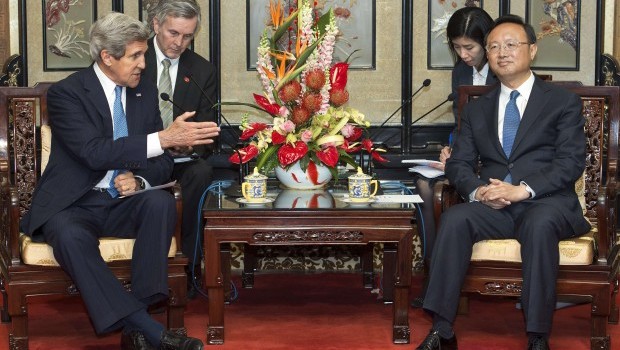
US Secretary of State John Kerry (L) speaks with Chinese state councilor Yang Jiechi (R) during a meeting at the Diaoyutai State Guesthouse in Beijing on April 13, 2013 (AFP PHOTO / POOL / Paul J. Richards)
The question now is whether Beijing will make good on its pledge to uphold “peace and stability” and work with Washington on achieving the goal of a nuclear-free Korean peninsula.
With North Korea seemingly readying a potential missile test, US Secretary of State John and China’s foreign policy chief, Yang Jiechi, stressed that their countries were committed to a peaceful resolution of the nuclear standoff.
Under young leader Kim Jong Un, North Korea has issued a series of brazen threats since testing an atomic device in February, including talk of launching nuclear strikes against the United States.
“We are able—the United States and China—to underscore our joint commitment to the denuclearization of the Korean peninsula in a peaceful manner,” Kerry told reporters before having dinner with Yang.
“We agreed that this is of critical importance for the stability of the region and indeed for the world and indeed for all of our nonproliferation efforts. This is the goal of the United States, of China” and of other countries that hope to resume nuclear talks one day with North Korea.
“From this moment forward we are committed to taking actions in order to make good on that goal,” Kerry added. “And we are determined to make that goal a reality. China and the United States must together take steps in order to achieve the goal of a denuclearized Korean peninsula. And today we agreed that further discussions to bear down very quickly with great specificity on exactly how we will accomplish this goal.”
Yang said his government’s position was clear.
“China is firmly committed to upholding peace and stability and advancing the denuclearization process on the Korean peninsula,” he said through an interpreter.
“We maintain that the issue should be handled and resolved peacefully through dialogue,” Yang said, adding that China would work with the United States and any other nation to resume talks with North Korea.
The US is counting on China to force its unruly neighbor to stand down. It’s a strategy that has produced uneven results over decades of American diplomacy, during which the North has developed and tested nuclear weapons and repeatedly imperiled peace on the Korean peninsula.
But with only the counter-threat of overwhelming force to offer the North Koreans, the US has little other option.
Neither Kerry nor Yang specifically addressed the immediate crisis: a North Korean test of a missile with a range of up to 2,500 miles that the US believes could happen any day.
Instead they focused on the long-term problem, which is a nuclear program that may soon, if not already, include the capability to deliver a warhead on a missile.
The question of North Korea’s capacity has been subject to great debate in Washington this past week after a US intelligence assessment suggested North Korea had the capacity to put a nuclear warhead on a missile, even if any such weapon would have low reliability.
China has the greatest leverage over North Korea, a country that like few in the world actually cherishes its isolation.
The Chinese dramatically have boosted trade ties with their neighbors and maintain close military relations some six decades after they fought side by side in the Korean War. They provide North Korea with most of its fuel and much of its food aid.
China has a history of quickly reversing course after talking tougher with North Korea. In late 2010, as American officials were praising Beijing for constructive efforts after the North shelled a South Korean island, a Chinese firm agreed to invest $2 billion in a North Korean industrial zone.
Beijing, which values stability in its region above all else, clearly has different priorities than Washington.
China’s greatest fear is the implosion of North Korea’s impoverished state and the resulting chaos that could cause, including possibly millions of refugees fleeing across the border into China.
For that reason, China has in many ways looked past North Korea’s bellicose rhetoric and activity, prioritizing the security of Kim’s government, like his father’s and grandfather’s, over nuclear proliferation concerns.
China also remains deeply wary of any American military buildup in its backyard. Chinese officials are suspicious that the containment effort toward North Korea may be part of the long-term U.S. strategy to expand its influence in the region and even ring in fast-growing China with countries closer to Washington.
US officials say they’ve gone to great lengths to explain to China that the American objective in North Korea, at least in the short term, is not to change governments.
The US abhors the North’s human rights record, its regular provocations and military links with other international pariahs such as Iran. But the U.S. has stressed over years of conversations with Beijing that pushing for North Korean denuclearization could reinforce stability.
In Seoul on Friday, Kerry said President Barack Obama had canceled a number of military exercises planned with South Korea. The message that the US wasn’t seeking a military confrontation was directed as much to the North as to Beijing.
The Obama administration believes it may now have greater scope for diplomatic progress.
It has pointed to new President Xi Jinping’s recent criticism of the North as illustrative of a subtle shift in China’s outlook. Beijing also has backed UN penalties in response to North Korea’s tests of a nuclear device and intercontinental ballistic missile technology over the last four months.
